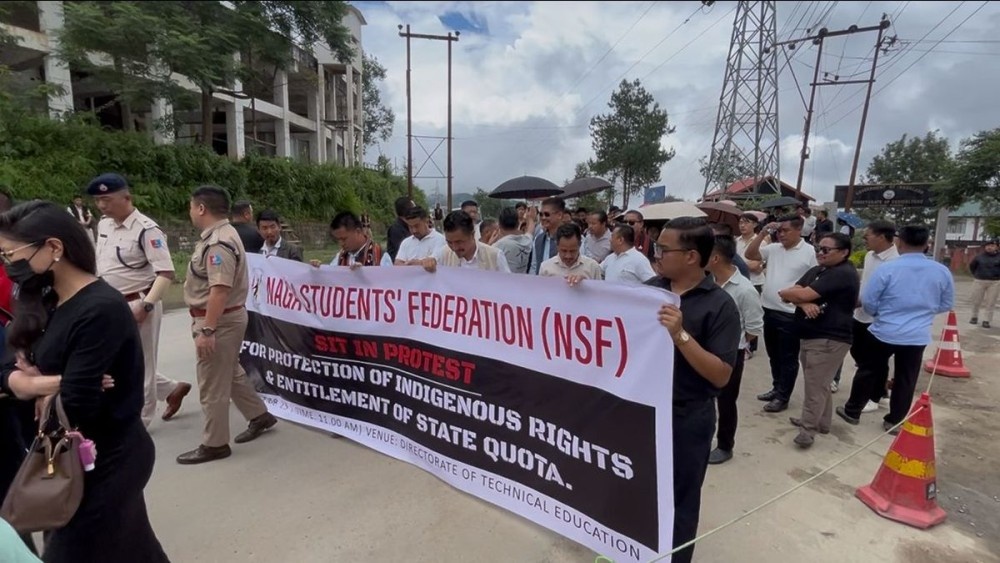
High Court Halts MBBS Seat Allocation Decision
The Gauhati High Court’s Principal Bench has temporarily suspended the implementation of an August 14 ruling that mandated Nagaland’s allocation of a central pool MBBS seat to the daughter of an Army officer. This interim order, issued during a hearing on August 19, comes as the State Government challenges the decision through a formal appeal. The Division Bench, led by Chief Justice Arun Dev Choudhury, directed that one seat remain unassigned until the appeal’s resolution, ensuring the outcome of the August 14 verdict remains in abeyance. The court’s directive follows a contentious legal battle over eligibility criteria for Central Government employees’ wards seeking admission to Nagaland’s central pool MBBS quota. The ruling stems from a writ petition contesting a 2021 state notification that set specific requirements for such candidates, including educational and residency benchmarks.
Nagaland’s Legal Arguments and State Concerns
Nagaland’s legal team has emphasized that the petitioner’s father, an Army Colonel stationed in the state, does not qualify as holding a ‘civil post’ under Central Government definitions. The state further contended that the aspirant’s relocation to Nagaland was not solely for educational benefits, as the daughter of defense personnel already has a dedicated quota in the central pool. The State Government argued that the Union Ministry of Health’s 2024 and 2025 guidelines are advisory rather than binding, allowing states to enforce their own eligibility rules. This stance highlights Nagaland’s critical need for medical education infrastructure, as the state’s single medical college struggles to meet demand with only 42 central pool seats allocated. The state also raised concerns about the petitioner’s failure to meet specific academic and residency criteria outlined in its 2021 notification.
Legal Proceedings and Pending Hearing
The dispute’s legal intricacies were further explored during the August 19 hearing, where the court acknowledged the petitioner’s academic credentials but noted the need for a thorough examination of the state’s arguments. The medical aspirant, appearing virtually, requested additional time to address the appeal, prompting the court to schedule the next hearing for September 8. The interim order explicitly states that the August 14 verdict’s implementation will remain suspended, with one seat reserved for potential allocation based on the appeal’s outcome. Legal experts suggest the case underscores the tension between state autonomy in educational policies and federal guidelines, with implications for similar disputes across India’s states.
Background and Public Response
The August 14 ruling, issued by a single judge in Kohima, quashed Nagaland’s 2021 notification and mandated the inclusion of the petitioner in the central pool quota due to her high NEET score. The court emphasized her academic merit over other candidates, prompting the state to file a review petition. The decision sparked public reactions, including an emergency sit-in protest by the Naga Students’ Federation (NSF) at Kohima’s NSF Solidarity Park. This protest highlighted broader concerns about educational equity and the state’s authority to set eligibility standards. The case now serves as a focal point for discussions on balancing state-specific policies with national educational frameworks, particularly in regions with limited healthcare infrastructure.
Implications for Educational Policy
The ongoing legal battle reflects a larger debate over state autonomy in managing educational resources and eligibility criteria for central pool seats. Nagaland’s position underscores the challenges faced by states with limited medical infrastructure in competing for limited seats. The court’s interim order to keep one seat vacant until the appeal concludes may set a precedent for similar disputes, emphasizing the need for clear federal-state coordination. Legal analysts suggest the case could influence future policies on central pool seat allocation, particularly for states with unique demographic and administrative needs. As the September 8 hearing approaches, the outcome may reshape the balance between state-specific requirements and national guidelines for educational access.



